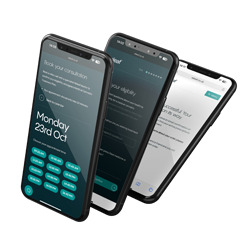Can CBD offer relief from back pain?
10 min read
Sam North
Back pain continues to be a prevalent issue not only here in the UK, but globally. While there is a range of both 'over-the-counter' and prescribable pharmaceuticals available, many patients are seeking natural therapeutic options that don’t cause excessive side effects or risk of dependence and can be easily added to a holistic treatment plan.
Contents
CBD is a non-intoxicating compound found in the cannabis plant and has the potential to provide numerous benefits to back pain patients. And while CBD has been shown to offer mild pain relief, it may also grant additional benefits for pain patients that include sleep enhancement, anxiety relief, and an overall boost to their general well-being.
Today, we’ll delve into the complex world of back pain, examine how medical cannabis, specifically CBD, works to potentially manage it, and provide you with guidance on how to take various CBD products as part of your treatment plan.
What is CBD?
Cannabidiol, also known as CBD, is a molecule that’s extracted from both hemp and cannabis plants. After THC, it is the most prevalent cannabinoid in most cannabis cultivars and comes in higher percentages in hemp plants. Here in the UK, the vast majority of CBD-based products source the contained CBD from hemp strains, as opposed to cannabis.
Unlike THC, CBD does not cause a “high” or intoxication, as it carries no psychotropic properties. Instead, studies have shown that this natural compound may offer various therapeutic benefits for both physical and mental health issues including chronic pain due to its anti-inflammatory and analgesic effects, all while allowing the patient to remain clear-headed and alert.
Understanding back pain
Back pain is a complex, often difficult-to-diagnose condition as it can originate from the bones, muscles, nerves, or ligaments. Some of the most common forms of back pain include sciatica – which causes sharp shooting pains down one or both legs; spinal stenosis – a narrowing of the spinal canal; and degenerative disc disease – a condition where the cushions between the vertebrae in the spine begin to deteriorate.
These conditions, along with many others, regularly cause inflammation and muscle tension in the lumbar region of the back, which leaves sufferers in extreme discomfort. Conventional treatment options for this type of pain usually include physical therapy, medications such as painkillers and anti-inflammatories, and in extreme cases, surgery.
But, for many patients, the idea of taking heavy pharmaceutical medications for extended periods of time or undergoing surgery is not appealing. This has led many to seek out novel, non-addictive ways to treat pain, such as the therapeutic administration of CBD and medical cannabis options that include THC. Medical cannabis can be prescribed for sciatica and other forms of lower back pain.
The benefits of CBD oil for back pain
CBD works differently than conventional medications used for pain management. Instead of blocking pain signals, CBD works to reduce inflammation and has been found to potentially offer natural relief from all types of chronic pain.
It works by interacting with the endocannabinoid system (ECS) – a vast, interconnected network of chemical receptors and pathways found throughout the brain and body that helps to regulate homeostasis (or balance) in bodily functions. While the ECS was only discovered in the late 80s, researchers now believe that it plays the role of 'master regulator' and that it helps to modulate or manage pain, inflammation, sleep cycles, appetite, and mood among a huge array of other bodily functions.
While research into the exact functions of CBD is still in the preliminary stages, studies suggest that CBD may act on various specific pathways within the ECS to reduce inflammation and offer pain relief. It has also been shown to reduce the enzymatic breakdown of our own endocannabinoids, which ultimately increases the efficacy of this system.
How does CBD work for back pain?
Due to pain being difficult to quantify objectively, pain research is somewhat limited to patients reporting their pain scores and often lacks non-subjective pain measurements.
As published on the NHS FAQ about cannabis-based products, patient groups report a significant number of patients that take cannabis for a wide range of pain issues can vouch for the efficacy of the relief it provides. While this is purely anecdotal evidence, it points to the therapeutic potential of CBD for back pain.
Even though many are providing anecdotal reports of effective relief with cannabis for their pain, the UK NHS explains how the current evidence is not sufficiently developed yet and there are no licensed cannabis products available for pain through NHS schemes.
Regardless of the sufficiency of the evidence the UK NHS requires, peer-reviewed research continues to emerge showing how CBD can help certain factors involved in back pain, such as relieving inflammation, combating anxiety, and improving sleep and relaxation.
This observational study, titled “The Use of Cannabidiol in Patients With Low Back Pain Caused by Lumbar Spinal Stenosis”, while relatively small in scale (with 48 participants), found very positive results. It concluded, “that treatment with hemp-derived CBD gel caps was associated with significant improvements in pain scores and several quality-of-life measures for patients with lumbar spinal stenosis”.
This case series and literature review, which looked into CBD as a potential complementary treatment for acute and chronic back pain also returned largely favourable results. The authors of the paper stated that “Hemp-derived CBD in a transdermal cream provided significant symptom and pain relief for the patients described in this case series”
While there is evidence suggesting CBD is effective in relieving and supporting back pain and symptoms, more research is required on humans to fully understand the potential effectiveness of CBD for back pain.
Apart from research focusing purely on back pain, there are some interesting papers regarding CBD application and pain in a broader context that we can have a brief look at.
“Cannabidiol as a Treatment for Chronic Pain: A Survey of Patients’ Perspectives and Attitudes” reported that, in a study of 253 patients, almost 60% reported that CBD products helped their pain and 67.6% found that they were able to reduce the intake of their pharmaceutical pain-relieving options.
This 2020 paper found that CBD shows potential as a treatment for chronic pain and improves the quality of life. However, it emphasizes that the administration of CBD should not be indiscriminate and needs to be context-specific, as its effectiveness varies depending on the condition being treated.
How to take CBD for back pain relief
How to take CBD for back pain relief will be a highly personalized experience that may require trying different types of CBD and higher or lower strengths, depending on multiple factors.
If you’re just getting started with CBD, it’s best to first have a quick chat with your primary healthcare provider to identify if there are any risks or potential drug interactions with your current regimen. By seeking the advice of a doctor that is registered to prescribe medicinal cannabis for back pain, and one that has experience doing so for back pain specifically, you will put yourself in the best possible position to make an informed decision.
Common types of CBD products include.
- Tincture oils – under the tongue method, fast-acting and long-lasting
- Vaporizing CBD flower – another fast-acting option, but the effects may be felt for a shorter period than when compared to sublingual tincture application.
- Topical creams – near instant effects at the location, but may take time for the deeper areas to feel the effects
- Pills and edibles – may take up to 1 or 2 hours to feel the effects. The bioavailability of CBD is lowered as it passes through the digestive system, but the effects will be felt for extended periods.
General daily intake guidelines recommend you start with a low dose and slowly increase the amount you take until you achieve the results you desire.
It’s recommended that you also incorporate regular exercise, stretching, mindfulness exercises and other self-care activities into your daily routine – as these are integral for supporting long-term back pain relief. Eating a balanced diet, rich in anti-inflammatory foods, can also help alleviate symptoms associated with chronic pain.
Tips on selecting quality CBD products and identifying reputable brands
When deciding on the best quality CBD products on the market, it’s important to know what to look for in a premium product line. With the monumental rise of consumer CBD products in the past six or so years, the UK market has seen some less than ideal products entering the shelves, from unregulated sources with little quality control to a plethora of companies claiming to have CBD products that don’t contain the stated CBD percentage.
Premium CBD products will be lab tested by a third party, and the CBD company should have a Certificate of Analysis (CoA) readily available for you to verify quality and safety.
The medical cannabis sector is subject to much heavier regulatory controls, and so by sourcing your CBD products through a prescription, you can ensure you’re getting the best quality CBD products on the market.
Final thoughts
While the body of research regarding CBD application for back pain is still in the preliminary stages, the evidence is pointing to it as being a safe and effective therapeutic option for back pain. There is more evidence to look at regarding CBD and pain in a broader sense.
Always seek advice from your registered medical cannabis doctor to make sure it's safe for you to take CBD and what dose is right for you.
That said, we must keep in mind that CBD is not meant to be used as a replacement for professional medical care or conventional treatment options. Think of CBD as one part of a holistic lifestyle approach to improving your overall health and well-being.
By creating a universal approach to your back pain relief and ensuring that adequate self-care is in check, you can take proactive steps to reduce inflammation and improve your overall health and well-being. CBD can be one of the tools in helping you reach this goal.
Releaf understands the importance of medical cannabis in treating various medical conditions. With our tailored monthly packages, specialist consultations for medical cannabis, and a unique medical cannabis card for protection, you can access the treatment you need without worrying about the stigma.
Share article
Did you like this article?
It is important to seek medical advice before starting any new treatments. The patient advisors at Releaf are available to provide expert advice and support. Alternatively, click here to book a consultation with one of our specialist doctors.
Elevate your wellness with medical cannabis
Get comprehensive care, convenience, and confidence with an all-in-one treatment plan.
Am I eligible?Authors
Sam North, a seasoned writer with over five years' experience and expertise in medicinal cannabis, brings clarity to complex concepts, focusing on education and informed use.
Editorial Policy
All of our articles are written by medical cannabis experts, guided by strict sourcing guidelines, and reference peer-reviewed studies and credible academic research. Our expert clinical team and compliance specialists provide valuable insights to ensure accuracy when required. Learn more in our editorial policy.
Need more help?











